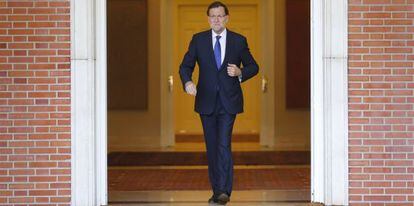Spanish prime minister: December 20 “most likely” election date
Rajoy struggling to find most propitious moment to hold what could be a watershed vote


After months of uncertainty over the date of Spain’s next general election, Prime Minister Mariano Rajoy offered one on Thursday morning.
“The most likely scenario is that there will be elections in Spain on December 20,” the conservative leader told a journalist interviewing him on the Cope radio network.
But Rajoy, of the Popular Party (PP), had to be asked repeatedly before coming up with a specific day. Earlier in the interview, he would only commit to sometime between December 13 and 20.
Even after advancing the December 20 date, Rajoy underscored that this was just “the most likely option”
Even after advancing the December 20 date, Rajoy underscored that this was just “the most likely option.”
The ruling party is struggling to find the most propitious moment to hold a vote that will be, in all likelihood, a watershed in Spanish politics. For the first time since Spain’s return to democracy after the Franco dictatorship ended in 1975, two parties other than the PP and the Socialists stand a chance at power, even if it is in a shared mode through governing coalitions.
Besides having to deal with the rise of Podemos and Ciudadanos, Rajoy also has to contend with the regional elections in Catalonia on September 27, which Catalan leader Artur Mas is viewing as a de facto plebiscite on his secessionist drive. If Mas’s coalition, Junts pel Sí, wins that ballot with a significant majority, Catalonia could unilaterally declare independence.
For the first time since Spain’s return to democracy, two parties other than the PP and the Socialists stand a chance at power
Rajoy said that no matter what happens at the general election, the party that wins the most votes should be allowed to govern. This was a reference to the situation in Madrid, where left-wing deals following municipal elections on May 24 allowed Manuela Carmena to become mayor even though, technically, Esperanza Aguirre of the PP had won the most votes.
With a view to the national post-election scenario, Rajoy said that a hypothetical deal between the Socialist Party and Podemos to push the PP from power was “not the best way of respecting the will of the citizens.”
Rajoy, who is hoping for re-election after his resounding victory in November 2011, noted that democratic Spain has always been ruled by the most-voted party, either with an absolute majority or through agreements with other forces.
But he added that power-sharing agreements between many parties “create governing difficulties,” and pointed to recent experiences in Madrid, Cádiz and A Coruña – where the Socialists teamed up with Podemos – as evidence that such projects “have not contributed anything good.”
English version by Susana Urra










































